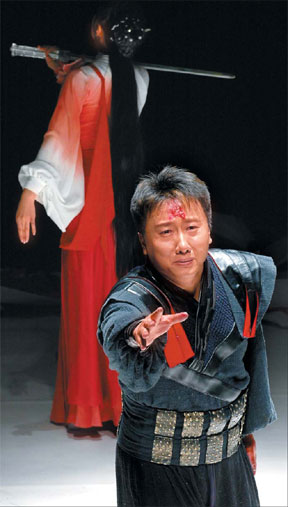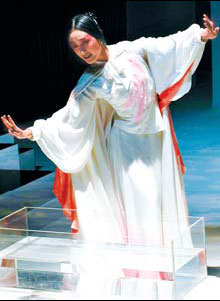Return of the king
A woman dressed in traditional white robes plays the guqin (ancient stringed instrument) at the side of the stage, on which one actor performs 13 roles without changing costume. The only actress, dressed in a conventional Peking Opera costume, sings in one scene and speaks in the next. And this all happens against the backdrop of an abstract image projected on a white Xuan paper.
|
Fang Zibing showcases his energy and passion in his portrayal of Xiang Yu. File photos |
It was Saturday night at the Oriental Avant-garde Theater, and the National Theater of China opened its 2008 season with a rather stylistic and sometimes laughably tragic play The King Mourns (Bawang Gexing).
It tells of the rise and fall of the King Xiang Yu who overthrew the Qin Dynasty (221-206 BC) but was finally defeated by another leader, Liu Bang, who later established the Western Han Dynasty (206 BC-AD 24).
The play is a modern adaptation of Pan Jun's novel Double Pupils, King Xiang Yu's Account of Himself. It is based on a famous historical incident from ancient China, somewhat akin to the tale of the Spartan king Leonidas leading his hopelessly outnumbered army to meet the Persian forces at the Thermopylae Pass in the 5th century BC. The Chinese story, however, has a crucial and memorable romantic complication.
At the end of the Qin Dynasty, the people rose against the emperor, the son of Qin Shihuang (the First Emperor). The country broke into separate states, each with several heroes born from the chaos proclaiming themselves king. Among them, two great leaders contended for supremacy: Xiang Yu, the King of Chu, and Liu Bang, the King of Han.
In the final battle in 202 BC, Xiang Yu was besieged by Liu. His troops ran out of food, and when they heard the songs from Kingdom Chu being sung by the enemy forces surrounding them, Xiang Yu was convinced that they had been conquered.
Xiang's concubine Yu Ji was determined to be with her love until her last moments. After performing a final sword dance for Xiang, she commits suicide with the same blade. Heartbroken and too proud to accept defeat, 31-year-old Xiang Yu slashes his throat.
The most famous rendering of the story is the Peking Opera version conceived and performed by Mei Lanfang (1894-1961), one of the most famous Peking Opera singers.
The 1993 Farewell My Concubine (Bawang Bieji), directed by Chen Kaige and starring Leslie Cheung and Gong Li, took the story around the world.
Writer Pan says Xiang Yu was not a hero in the minds of men. In a man's world, the winner is the king and the loser will always be the bandit. He says they've got used to judge a hero by success or failure.
Two kinds of groups appreciate Xiang Yu - women and the literati. That's why the female poet Li Qingzhao (1084-1151) wrote a famous poem to show admiration for Xiang Yu, Pan says.
Though written from the playwright's point of view, when Pan gave the work to director Wang Xiaoying in 2004, the director loved it immediately.
Wang says: "Xiang Yu is one of the two tragic figures in Chinese history that touch me most and I share many of Pan's feelings of the character."
|
Liu Lu's Peking Opera performance is one of the highlights in the play. |
In Farewell My Concubine, Xiang Yu is depicted as a depressed king who is guilt-ridden about his leadership failings, and chooses to kill himself rather than face his family.
In many history books, Xiang Yu is described with rude manners, arrogance and lack of political vision. He alienates others with his conceited and obstinate nature.
But in Wang's eyes, Xiang Yu is a noble general, and a brilliant military strategist. He is a man of principle who places his love of Yu Ji above his political ambitions. "He cuts his own throat not because he feels guilty and ashamed, but to maintain his dignity," Wang says.
"I hope today's audience who live in a society stuffed with material desires can find a home for soul on stage after they watch the play," the director adds.
Because Pan wrote the novel in an avant-garde style, Wang, a director famous for his poetic and experimental works, decided to present it in a bold way too.
He planned to have only one actor to perform all 16 roles, which turned out to be impractical but one actor playing 13 roles is still pushing the envelope. He also mixes Peking Opera, video, installation art, and music together.
(China Daily 03/18/2008 page19)
















